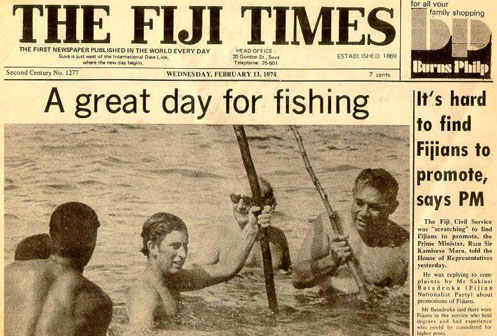
The doomsday brigade is quickly at it again with its tenacious state gagging scenario at the Fiji Times. Media voices trot out the same tired old media freedom clichés about the fate of the ex-News Ltd newspaper that did so much to dig its own grave. Café Pacific prefers to keep an open mind and see what Motibhai’s new publisher, Dallas Swinstead, can produce. Give him time. A breath of fresh air and a strategic rethink of how to go about being an effective newspaper faced with the reality of a military-backed authoritarian regime. A real challenge.
Murdoch's previous News Ltd managers at the FT failed to get to grips with reality in Fiji. The combination of ownership by a Fiji company headed by astute businessman Mahendra "Mac" Patel, who had long experience at the newspaper as a director, and a trusted publisher, who already had a track record as an innovative chief executive at the helm for four years – albeit during more relaxed times – could yet turn out to be a winner.
And if the Fiji Times succeeds in negotiating the media decree minefield and staying afloat with its long-lost integrity restored, then chalk that up as a media freedom success. If the newspaper learns from its past divisive mistakes, then even better. This outcome is vastly preferable to the News Ltd debacle that brought the newspaper to the brink of closure. Netani Rika and Margaret Wise are synonymous with that partisan era of questionable ethics. Rika "sacrificed" his job for the good of the company. But the rot had actually set in long before the George Speight attempted coup in May 2000.
The International Federation of Journalists voiced concern for the future of “critical and independent media” in Fiji, with secretary-general Aidan White saying: “The regime-imposed pressures on the Fiji Times risk silencing anyone who dares to stand up to defend independent media for the people of Fiji.” The Pacific Freedom Forum is concerned about “increasing confusion” as spin and silence reigns with a new Fiji clampdown. The regime friendly rival Fiji Sun reported the Fiji Times newsroom in a turmoil. Veteran columnist Seona Smiles says the resignation of Rika and the uncertainty over deputy editor Sophie Foster is a “great loss” to the newspaper.
For people to have to leave a job that they are both competent at, for political reasons, is always difficult. And both Netani Rika and Sophie Foster remained very staunch and true to journalistic ethics, throughout the recent period of political crisis.
However, in spite of all the hype and spin by both the regime and some media freedom opportunists, when a new broom is brought into a newspaper with change of ownership, it is normal for a change of editor and top editorial management. Café Pacific publisher David Robie flagged an editorial reshuffle in an interview with Radio NZ International’s Mediawatch programme last Sunday. Pacific Media Watch's Alex Perrottet reported the interview, quoting Dr Robie as saying that the Fiji Times was “going back to the future”:
As the dust settles, they may well look at another editor who would probably be more in tune with what Dallas Swinstead is going to try and do …
He is likely to take a more diplomatic approach to the regime than his immediate predecessors. But I certainly don’t think he is going to be kowtowing to the regime. He has made some quite strong comments since he has been appointed.
But whether Fred Wesley is the right choice as acting editor-in-chief is another matter. Swinstead himself confirmed that he would be trying to “rebuild the relationship” with the regime in an interview with Fiji Broadcasting Corporation news director Stan Simpson:
Yes, we are changing direction. Having watched News Ltd perish in this country, there’s no sense in committing suicide – even with a local-owned replacement. There is no doubt that The Fiji Times cannot be antagonistic to the government. What on earth does it prove? But we will ask questions in a fair and balanced way because we will be helping to bring the people to the government.
Picture: How the old Fiji Times looked in 1974 - before Dallas Swinstead revamped the paper during his first stint as publisher for four years, 1976-1980. Photo: Fiji Times
- New direction for Fiji Times - Dallas Swinstead interview with FBC's Stan Simpson
- Full text of the interview - only on the Pacific Media Centre niusblog
- Rowan Callick on Fiji's 'invisible gentler face'
- Listen to Radio NZI’s Mediawatch interview with David Robie on Fiji [@22m08s]



